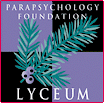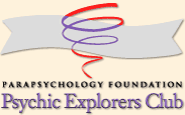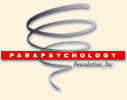 |
 |
| Click here for a French version of this blog
PF Lyceum Blog #5, November 17rd, 2005 Caroline Watt, Ph.D. (For a biography of Guest Blogger Dr. Caroline Watt, click here.) As one might guess from the terminology, the disciplines of psychology and parapsychology have much in common. Psychology derives from the Greek psyche (soul, mind) and logos (rational discussion). How does that translate in modern terms? A quick look at a couple of psychology textbooks gives the following definitions of psychology: “the scientific study of experience and behaviour, and the science of behaviour and mental processes.” The prefix para also comes from Greek, meaning “alongside” or “beyond”. Thus, parapsychology can be defined as the study of “apparent anomalies of behaviour and experience that exist apart from currently known explanatory mechanisms” (click here for terms and methods in parapsychology from the website of the Parapsychological Association, and here for the PF Lyceum Blog #1, “What is Parapsychology?”.) In order to understand the relationship between parapsychology and psychology, it’s helpful to look at some history. Modern-day parapsychology could be regarded as a kind of off-shoot or extension from psychology. But this has not always been the case. Over a century ago, the demarcation between psychology and what was then known as “psychical research” was far less clear. Experimental psychology began with the founding of Wilhelm Wundt’s psychology laboratory in Leipzig in 1879. The emphasis was on understanding people’s perceptual, cognitive and motor functions, using statistical analysis of experimental data. Both in the US and on the European continent, many early experimental psychologists worked within a scientific worldview that nature was understandable through careful observation and discovery of mechanistic laws. In Britain, however, a dissident group of thinkers felt that the prevailing mechanistic model had wrongly demoted the role of mind in nature. Historians such as Oppenheim (1985) have argued that this group exerted a strong influence on the development of psychology. Frederic Myers (for a list of links click here and for a bibliography of works by and about Myers click here), Henry Sidgwick, and Edmund Gurney were prominent and respectable academic figures who attempted to apply scientific method to the study of a wide variety of mental phenomena. They were some of the main workers in the London-based Society for Psychical Research founded in 1882. For example, they studied the survival of human personality after death, and anomalous phenomena associated with mesmerism and spiritualism, including the strange physical manifestations reported to occur during séances with spiritualist mediums. These phenomena are today associated with parapsychology but the earliest researchers considered these topics to have a rightful place in mainstream psychology (Oppenheim, 1985). This group of thinkers challenged the reductionistic and mechanistic agenda that was taking hold in psychology. However, with the rising popularity of spiritualism as a Victorian parlour entertainment, and the exposure of fraudulent spiritualist mediums, much of the scientific orthodoxy felt that it should distance itself from psychical research (Coon, 1992). Hence, psychology and psychical research parted ways. But modern-day psychology still bears the imprint of its shared origins with psychical research. Several historians have persuasively demonstrated the influence of psychical researchers on the development of concepts in what would become mainstream psychology. Gurney and Myers’ studies of hypnosis and mediums assisted in establishing the concepts of dissociation and the subconscious mind (Alvarado, 2002, 2005; Kelly, 2001). Pierre Janet and Alfred Binet were interested in the pathology of mediumship and this led to the development of concepts in abnormal psychology and in psychiatry (Crabtree, 1993). And in his work The Discovery of the Unconscious, Ellenberger (1970) argued that interest in psi phenomena and spiritism were influential in developing ideas of the mind in psychology. How do the two disciplines interact nowadays? I think it is fair to say that an uneasy truce has been declared. In the US, parapsychology is rarely represented in university psychology departments. This may be in part due to the legacy of J.B. Rhine (widely regarded as the founder of experimental parapsychology in the 1930s), whose Parapsychology Laboratory was originally part of Duke University in Durham, NC. Rhine was able to raise funds to make his laboratory independent of the university, and it seems by mutual agreement parapsychology’s ties with Duke were severed. Rhine’s work continued as he created the Foundation for Research into the Nature of Man but this represented a retreat from the previous policy of Rhine and his mentor William McDougall of infiltrating US universities. In more recent years, then, parapsychology in the US has tended to be conducted in independent laboratories. In Britain and the European continent, parapsychology has more often found a home within university psychology departments. Perhaps the best known of these is Edinburgh University, which has hosted a Chair of Parapsychology since 1985, and around which has grown a group of reseachers known as the Koestler Parapsychology Unit. Indeed for many years before the Chair became established at Edinburgh, one of its staff members, Dr. John Beloff, had been conducting parapsychological research and supervising Ph.D. students doing theses on parapsychological topics. Dozens of students have since done parapsychology Ph.D.s at Edinburgh, often dealing with questions that bridge psychology and parapsychology. A look at the themes of some of the Koestler Unit doctoral theses gives a snapshot of how psychology and parapsychology can overlap. My work compared subliminal perception to extrasensory perception. In 1989 Dr. Konrad Morgan studied human-computer interaction (including possible paranormal effects upon computers). In 1992 Dr. Robin Taylor looked at enhancing athletic and psychic performances through the use of imagery-based mental strategies. Also in 1992, Dr. Richard Wiseman (now a Professor of psychology at the University of Hertfordshire) studied the application of schema theory in assessing psychic claimants. In 1995, Dr. Chris Roe (now a Senior Lecturer in psychology at the University of Northampton) studied persuasion in the context of a psychic reading. In 1997, Dr. Carlos S. Alvarado (now Assistant Professor of Research in Psychiatric Medicine at the Division of Personality Studies of the University of Virginia, and the Chairman of Domestic and International Programs at the Parapsychology Foundation) investigated psychological and phenomenological characteristics of out-of-body experiences. This is just a small selection, but it demonstrates not only that there are many different ways in which parapsychology and psychology overlap, but also that one can progress with an academic career having studied a parapsychological topic. If a student does, however, want to explore parapsychology further, some caution should be exercised. Despite some compelling landmark papers supporting the psi hypothesis (e.g., Bem & Honorton, 1994) I think that most mainstream scientists remain to be convinced that parapsychologists have demonstrated replicable evidence of psi. Thus, there continues to be controversy over that aspect of parapsychology that focuses on paranormal explanations for people’s seemingly psychic experiences. As a student, putting all one’s eggs in the psi basket could be detrimental if, in future, the accumulating body of evidence tends not to support the psi hypothesis. Professor Robert Morris, who held the Koestler Chair of Parapsychology until his untimely death in 2004, always encouraged his Ph.D. students to try to incorporate mainstream psychology alongside parapsychology in their theses. He felt that this would give them a wider expertise given that there are few career opportunities in parapsychology (For those of you who are thinking of doing post-graduate work on parapsychology topics, see the PF Lyceum’s list of Theses and Dissertation Topics). Whether or not genuine psi exists, polls show that a very large percentage of individuals report paranormal experiences and beliefs. This fact alone suggests that psychologists and parapsychologists have exciting and potentially fruitful work to do in order to understand these experiences and beliefs. A great deal remains to be done in elaborating the phenomenology, causes and consequences of paranormal experiences, and psychologists are now giving serious attention to this previously-neglected topic (e.g., Cardeña, Lynn, & Krippner, 2001). So, in this area at least, we can perhaps envisage the future paths of parapsychology and psychology converging once more. Alvarado, C. S. (2002). Dissociation in Britain during the late nineteenth century: The Society for Psychical Research, 1882-1900. Journal of Trauma and Dissociation, 3, 9-33. Alvarado, C. S. (2005). On the centenary of Frederic W. H. Myers’s Human Personality and Its Survival of Bodily Death. Journal of Parapsychology, 68, 3-43. Bem, D. J., & Honorton, C. (1994). Does psi exist? Replicable evidence for an anomalous process of information transfer. Psychological Bulletin, 115, 4-18. Cardeña, E., Lynn, S. J., & Krippner, S. (2000). Varieties of Anomalous Experience. Washington DC: American Psychological Association. Coon, D. J. (1992). Testing the limits of sense and science: American experimental psychologists combat spiritualism, 1880-1920. American Psychologist, 47, 143-151. Crabtree, A. (1993). From Mesmer to Freud: Magnetic Sleep and the Roots of Psychological Healing. New Haven, CT: Yale University Press. Ellenberger, H. F. (1970). The Discovery of the Unconscious: The History and Evolution of Dynamic Psychiatry. New York: Basic Books. Kelly, E. W. (2001). The contributions of F. W. H. Myers to Psychology. Journal of the Society for Psychical Research, 65, 65-90. Oppenheim, J. (1985). The Other World. Spiritualism and Psychical Research in England, 1850-1914. Cambridge: Cambridge University Press.
Click here for Past Blogs |
 |

|
 www. parapsychology. org |
||